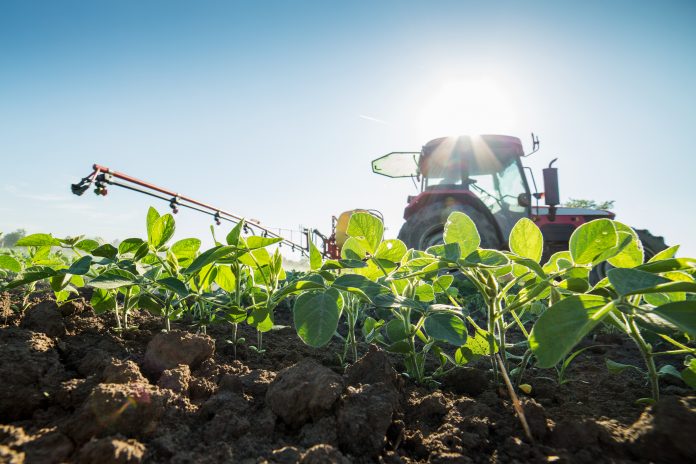Jane Mills, University of Gloucestershire, tells us about the SPRINT project’s aim to tackle the impacts of pesticides on human, animal and environmental health
Farming systems in Europe rely heavily on pesticides to secure yields and food safety in crop production. Due to this reliance, it is common to find multiple pesticide residues in soil, water, crops, food and feed, animals and humans. Much is still unknown about the impacts of these residues in the environment, especially when mixed – often described as a ‘cocktail effect’. There is increasing public concern about the effects of pesticides on human, animal and environmental health. For example, a few studies suggest an association between pesticide use and Parkinson’s disease. In France, Parkinson’s disease has now been classified as an occupational disease. Other studies, for example in Germany, have linked drastic declines in insect populations to the widespread use of agricultural pesticides.
The European Commission recognises the need to reduce the reliance of agriculture on pesticides. As a result, its ‘Farm to Fork Strategy’ introduced in May 2020 sets out a target to “reduce the overall use and risk of chemical pesticides by 50% and the use of more hazardous pesticides by 50% by 2030”. In addition, a goal has been set for 25% of total European Union (EU) farmland to be managed organically by 2030, an increase of 16.5% from today’s levels.
All pesticide approval is regulated both at the European and national level. However, research is needed to develop tools, which can better understand the overall risks and impacts of pesticide mixtures on the environment, animals and humans and identify and foster effective risk reduction options.
Introducing the SPRINT project
The 5-year SPRINT project, which started in September 2020, is funded by the EU Horizon 2020 research programme and has two key aims: First, to develop a Global Health Risk Assessment toolbox for pesticides to assess the exposure, risks and impacts of pesticide mixtures on human, animal, and ecosystem health. Second, to identify farming practices and policy changes that help farmers rely less on chemical pesticides and transition towards sustainable food production.
The SPRINT team comprises 28 partners from across Europe and Argentina (where fodder crops are grown for European markets). The team is transdisciplinary, with scientists from soil science, agronomy, ecology, sustainability assessment, (eco)toxicology, epidemiology, and the social sciences. The project is working closely with both conventional and organic farmers, and their neighbours and consumers. In 11 case study countries, these participants will contribute specimens for testing, and additionally, samples will be taken from the soil, water, air, crops, and livestock on farms.
Developing a Global Health Risk Assessment Toolbox for Pesticides
The findings of SPRINT will improve the pesticide evaluation process by creating a Global Health Impact Assessment toolbox with aligned tools and methods for an integrated assessment of pesticide exposure, risks and sustainability.
Pesticides undergo extensive testing before they become available on the market. Based on this testing, the European Food Safety Authority (EFSA) and national authorisation organisations determine the conditions of their use. However, it is widely recognised that the standards used in this testing are inadequate for a comprehensive and realistic risk assessment and urgently need improving. Important factors are missing, for example, these tests do not assess the risks of pesticide cocktails on human and ecosystem health. Furthermore, important pesticide transport pathways, such as, movement via air and dust are missing from the models predicting pesticide fate.
Within SPRINT, we are developing innovative approaches to study how pesticide mixtures affect resilience, reproductivity and contribute to the development of diseases in ecosystems, livestock and humans. The approach includes new (eco)toxicological tests (with new endpoints) and microbiome tests, which will enable predictions on the impact of pesticide use on human health and on the environment.
Supporting a transition to reduced pesticide use across Europe
Based on an inventory of the pesticide distribution and health status in all case study areas, SPRINT will evaluate the environmental and economic sustainability impacts for farmers and society of different pesticide use options.
By actively engaging with farmers and other main players in the food production chain, and policymakers, we will identify the transition needs of the whole food chain and the policy actions that will lead to a 50% reduction of pesticide risk/use and a transition to sustainable farming.
Initially, visions and goals for the transition are being defined and compared with the current state. This research includes identifying lock-ins and barriers, including path dependency, farmers’ attitudes or economic constraints, regulatory governance mechanisms, consumer expectations of cheap food, subsidy structure, or lack of knowledge and applied research to reduce the risk of existing pesticides and to identify viable alternatives in support of the European and global sustainable development agenda.
Moving from the undesirable current state to the desired goal will be explored and defined in the second step. The technical and regulatory aspects of the transition will also be considered in cross-regional workshops bringing together relevant regulatory and policy stakeholders.
Through these activities, the SPRINT project will make an internationally relevant contribution to assessing the integrated risks and impacts of pesticides on the environment and human health, both at the regional and European level. SPRINT will also inform and accelerate the adoption of innovative transition pathways towards more sustainable crop protection.
SPRINT (Sustainable Plant Protection Transition) has received funding from the European Union’s HORIZON 2020 Research programme under the Grant Agreement no. 862568.
Please note: This is a commercial profile.
© 2019. This work is licensed under CC-BY-NC-ND.











